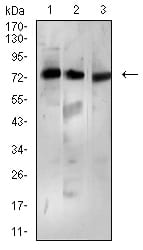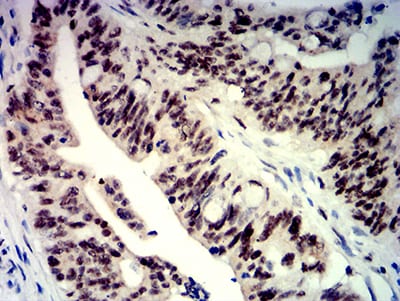


| WB | 1/500 - 1/2000 | Human,Mouse,Rat |
| IF | 咨询技术 | Human,Mouse,Rat |
| IHC | 1/200 - 1/1000 | Human,Mouse,Rat |
| ICC | 技术咨询 | Human,Mouse,Rat |
| FCM | 咨询技术 | Human,Mouse,Rat |
| Elisa | 1/10000 | Human,Mouse,Rat |
| Aliases | FWD1; FBW1A; FBXW1; bTrCP; FBXW1A; bTrCP1; betaTrCP; BETA-TRCP |
| Entrez GeneID | 8945 |
| clone | 3D5E6 |
| WB Predicted band size | 68.9kDa |
| Host/Isotype | Mouse IgG1 |
| Antibody Type | Primary antibody |
| Storage | Store at 4°C short term. Aliquot and store at -20°C long term. Avoid freeze/thaw cycles. |
| Species Reactivity | Human |
| Immunogen | Purified recombinant fragment of human BTRC (AA: 24-151) expressed in E. Coli. |
| Formulation | Purified antibody in PBS with 0.05% sodium azide |
+ +
以下是关于BTRC(β-TrCP)抗体的3篇代表性文献,涵盖其在信号通路和疾病中的研究应用:
---
1. **文献名称**:*Identification of a novel ubiquitin-conjugating enzyme involved in NF-κB activation*
**作者**:Yaron, A., et al.
**摘要**:该研究揭示了BTRC(β-TrCP)作为E3泛素连接酶复合体的关键组分,通过介导IκBα的磷酸化依赖性泛素化降解,激活NF-κB信号通路。实验中通过BTRC抗体进行免疫共沉淀(Co-IP),证实了其与IκBα的相互作用。
---
2. **文献名称**:*The F-box protein β-TrCP associates with phosphorylated β-catenin and regulates its activity in the Wnt signaling pathway*
**作者**:Fuchs, S.Y., et al.
**摘要**:研究发现BTRC通过识别磷酸化的β-catenin并促进其泛素化降解,负调控Wnt信号通路。文中利用BTRC抗体进行Western blot和免疫荧光实验,证明其在结肠癌细胞中调控β-catenin稳定性的作用。
---
3. **文献名称**:*Role of β-TrCP in DNA damage response and cancer progression*
**作者**:Nakayama, K., et al.
**摘要**:该文献阐明了BTRC在DNA损伤应答中通过靶向降解细胞周期调控蛋白(如CDC25A)来阻滞细胞周期进程。研究使用BTRC特异性抗体进行免疫组化分析,显示其在多种癌症组织中表达异常,提示其潜在临床意义。
---
这些文献展示了BTRC抗体在机制研究(如蛋白相互作用、降解途径)和疾病模型(如癌症、信号通路失调)中的关键应用。
BTRC (Beta-Transducin Repeat Containing E3 Ubiquitin Protein Ligase), also known as β-TrCP, is a key component of the SCF (Skp1-Cul1-F-box protein) E3 ubiquitin ligase complex. It plays a critical role in the ubiquitin-proteasome system by targeting specific substrates for degradation, thereby regulating diverse cellular processes such as cell cycle progression, DNA damage response, and signal transduction. BTRC recognizes phosphorylated degron motifs on substrate proteins, including NF-κB inhibitor (IκB), β-catenin, and Emi1. linking their ubiquitination to proteasomal destruction. Dysregulation of BTRC is implicated in diseases like cancer, inflammation, and neurodegenerative disorders due to altered substrate stability.
BTRC antibodies are essential tools for studying its expression, localization, and interactions in cellular contexts. They are widely used in techniques like Western blotting, immunoprecipitation, and immunofluorescence to investigate BTRC’s role in pathways such as Wnt/β-catenin and NF-κB signaling. Researchers also employ these antibodies to explore BTRC’s involvement in therapeutic resistance or as a potential biomarker. Commercial BTRC antibodies are typically validated for specificity against human, mouse, or rat isoforms, with applications spanning basic research and drug development. Understanding BTRC dynamics through such reagents contributes to elucidating disease mechanisms and identifying targeted therapies.
×